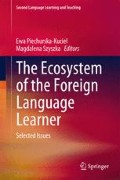Abstract
This paper sets out to advance the notion of critical literacy in view of the growing shortage of critical analytic skills even among college students. Critical literacy is defined as a disposition for critical reflection and critical practice. It is employed in the academic context in the systematic interrogation of discursive practices which are sometimes ideologically motivated. Being skilled at critiquing in the advanced EFL context is derivative of a certain general level of critical literacy. It is claimed here that this can be attained through introducing students to categories and procedures of the main rhetorical traditions: neo-Aristotelian rhetoric, the New Rhetoric and Burkean dramatism. Subsequently, the paper reports on a pilot rhetorical training administered to undergraduate students majoring in Cultural and Media Studies at the Institute of English, Opole University, Poland. It describes the main contents of the training, which culminated in students’ applying rhetorical criticism in an analysis of a worthy text of their choice. Students’ proficient applications of diverse rhetorical categories in their final assessment tasks are exemplified and discussed. Even though the majority used simple neo-Aristotelian categories, some combined various rhetorical procedures, including the sophisticated notions of Burkean rhetoric. The results of students’ evaluation of the training are also presented. Students find rhetorical criticism a difficult but rewarding, and, above all, increasingly indispensable skill. Both types of data testify to the usefulness of rhetorical training in the advanced EFL context, particularly in fostering critical literacy skills in a student-centered approach.
This study is a follow-up to an action research devoted to diagnosing students’ problems with critical literacy which was presented in Molek-Kozakowska (2013). How to foster critical literacy in academic contexts: Some insights from action research on writing research papers. In E. Piechurska-Kuciel & E. Szymańska-Czaplak (Eds.), Language in cognition and affect (pp. 95–110). Heidelberg: Springer.
Access this chapter
Tax calculation will be finalised at checkout
Purchases are for personal use only
Notes
- 1.
The codes refer to student’s initials, type of course taken: d—day, e—extramural, and the page(s) in the standardized printout of the critical essay where the quoted material was excerpted from. Some excerpts might include stylistic mistakes, as they were reproduced verbatim from the submitted critiques.
References
Aristotle. (2010). Rhetoric (W. Rhys Roberts, Trans.). Electronic Classics Series. Philadelphia, PA: Pennsylvania University.
Bertelsen, D. (2002). Kenneth Burke and multiculturalism: A voice of ethnocentrism and apologia. Communication Quarterly, 50(2), 82–89.
Burke, K. (1945). A grammar of motives. Berkeley, CA: University of California Press.
Burke, K. (1950). A rhetoric of motives. Berkeley, CA: University of California Press.
Burke, K. (1955). Linguistic approaches to problems of education. In N. B. Henry (Ed.), Modern philosophies and education (pp. 259–303). Chicago, IL: University of Chicago Press.
Burke, K. (1966). Language as symbolic action. Berkeley, CA: University of California Press.
Cockcroft, R. (2004). Putting Aristotle to the proof: Style, substance and the ELP group. Language and Literature, 13(3), 195–215.
Conrad, Ch., & Malphurs, R. (2008). Are we there yet? Are we there yet? Management Communication Quarterly, 22(1), 123–146.
Enoch, J. (2004). Becoming symbol-wise: Kenneth Burke’s pedagogy of critical reflection. College Composition and Communication, 56, 272–296.
Fairclough, N. (Ed.). (1992). Critical language awareness. Harlow, UK: Longman.
Fairclough, N. (1995). Critical discourse analysis: Papers in the critical study of language. Harlow, UK: Longman.
Freire, P. (1972). The pedagogy of the oppressed. London, UK: Penguin.
Holme, R. (2004). Literacy: An introduction. Edinburgh, UK: Edinburgh University Press.
Hunt, S. (2003). An essay on publishing standards for rhetorical criticism. Communication Studies, 54(3), 378–384.
Janks, H. (2010). Literacy and power. London, UK: Routledge.
Kanpol, B. (1994). Critical pedagogy: An introduction. Westport, CT: Bergin & Garvey.
Mac Naughton, G. (2005). Doing Foucault in early childhood studies: Applying poststructural ideas. London, UK: Routledge.
Molek-Kozakowska, K. (2013). How to foster critical literacy in academic contexts: Some insights from action research on writing research papers. In E. Piechurska-Kuciel & E. Szymańska-Czaplak (Eds.), Language in cognition and affect (pp. 95–110). Heidelberg, Germany: Springer.
Molek-Kozakowska, K. (2015). Design and style of cultural and media studies textbooks for college students. In L. Piasecka, M. Adams-Tukiendorf & P. Wilk (Eds.), New media and perennial problems in foreign language learning and teaching (pp. 189–207). Heidelberg, Germany: Springer.
Morgan, W. (1997). Critical literacy in the classroom: The art of the possible. London, UK: Routledge.
Perelman, Ch. (1979). The new rhetoric and the humanities: Essays on rhetoric and its applications. Boston, MA: Reidel.
Perelman, Ch. (1981). L’empire rhetorique. Rhetorique et argumentacion. Paris, France: Librairie Philosophique J. Vrin.
Perelman, Ch., & Olbrechts-Tyteca, L. (1969). The new rhetoric: A treatise on argumentation. Notre Dame, IN: University of Notre Dame.
Pratkanis, A., & Aronson, E. (2001). Age of propaganda: The everyday use and abuse of persuasion. New York, NY: W. H. Freeman.
Richardson, J. (2007). Analysing newspapers: An approach from critical discourse analysis. Basingstoke, England: Palgrave Macmillan.
Ricoeur, P. (1976). Interpretation theory: Discourse and the surplus of meaning. Fort Worth, TX: Texas Christian University Press.
Author information
Authors and Affiliations
Corresponding author
Editor information
Editors and Affiliations
Rights and permissions
Copyright information
© 2015 Springer International Publishing Switzerland
About this chapter
Cite this chapter
Molek-Kozakowska, K. (2015). Rhetorical Criticism as an Advanced Literacy Practice: A Report on a Pilot Training. In: Piechurska-Kuciel, E., Szyszka, M. (eds) The Ecosystem of the Foreign Language Learner. Second Language Learning and Teaching. Springer, Cham. https://doi.org/10.1007/978-3-319-14334-7_11
Download citation
DOI: https://doi.org/10.1007/978-3-319-14334-7_11
Published:
Publisher Name: Springer, Cham
Print ISBN: 978-3-319-14333-0
Online ISBN: 978-3-319-14334-7
eBook Packages: Humanities, Social Sciences and LawEducation (R0)

